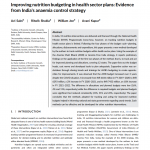
Quis custodiet ipsos custodes?
7 August 2009
The tabling and subsequent withdrawal of the Judges (Declaration of Assets and Liabilities) Act, 2009 by the Law Minister Veerappa Moily has raised several key questions pertaining to the power of the RTI Act 2005 and judicial accountability. The subsequent hue-and-cry among the opposition & civil society organizations and the media interest generated on what seems to be a double standard adopted in the implementation of the RTI act by shielding of judges from scrutiny has confined the bill in its current form to the dustbin. Reforming and making the judiciary more accountable indeed is the need of the hour, however, successive governments have failed in taking any meaningful steps in this direction, under pressure from both the judiciary itself and political considerations.
A CMS-TI study threw light upon the reasons for corruption in the judiciary. From misuse of power by judges without fear of any action being taken, a tedious impeachment process (no judge has ever been impeached by Parliament since Independence) and above all, the inefficient pace at which cases move through the courts all make it possible for people wanting to pay to speed up the system and get favourable judgements, to be able to do so.
Arguments for the Bill in its current form come from well-regarded members of the legal fraternity. It usually boils down to the possibility of harassment of judges handling controversial cases. Though this may be true, the question remains whether a blanket law allowing non-disclosure of assets will do more harm than good. Public perception of the independence and incorruptibility of the Judiciary will definitely take a hit. By excluding judges from declaring their assets, the big fear is that it will indicate that they are a separate class of citizenry, an argument which would take on a different dimension if extended to our politicians and other public servants. Quis custodiet ipsos custodes? (Who watches the watchers?) seems appropriate here.
Abhijit Patnaik is Senior Researcher at the Accountability Initiative





